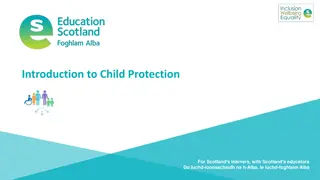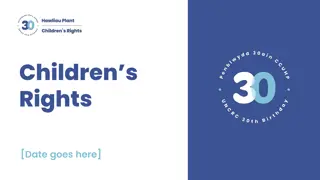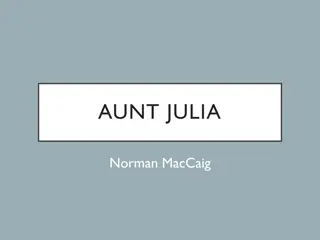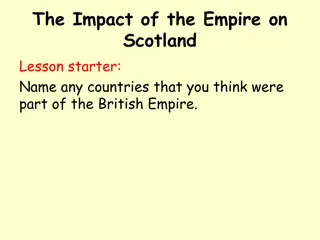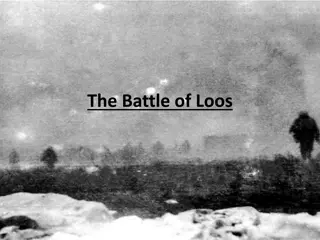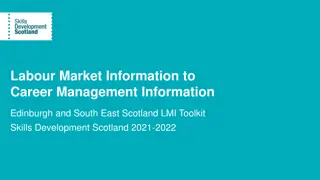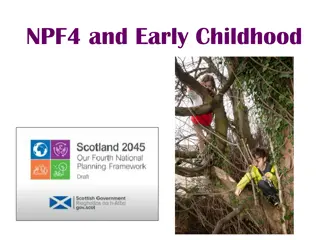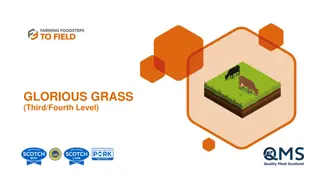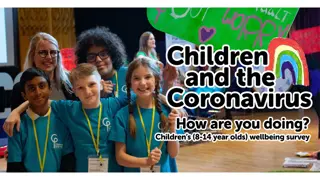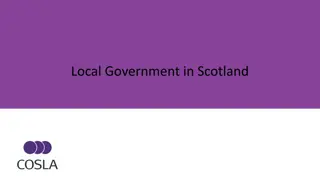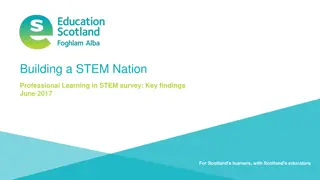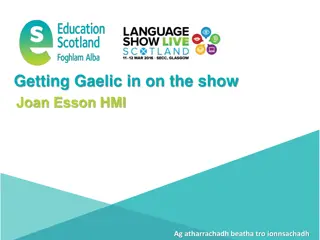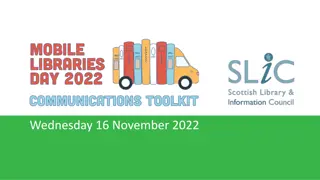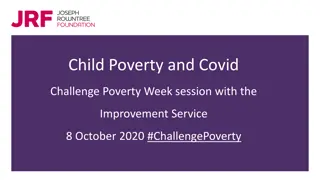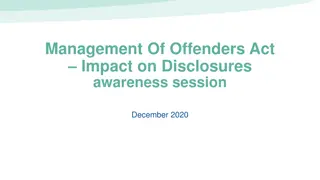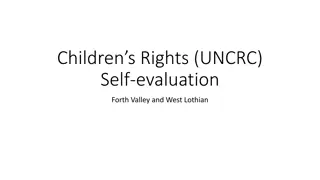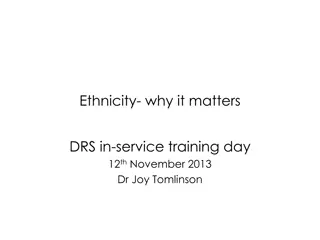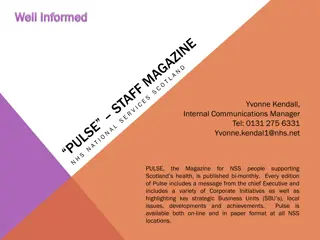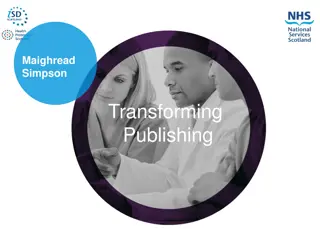Understanding the UNCRC and Its Impact on Education in Scotland
The United Nations Convention on the Rights of the Child (UNCRC) ensures every child's right to survival, protection, and education, regardless of race, religion, or abilities. This legally-binding international agreement outlines civil, political, economic, social, and cultural rights for children. The UNCRC emphasizes universal, unconditional, inalienable, and indivisible rights, with a focus on provision, protection, and participation. General principles underpin these rights, such as non-discrimination, prioritizing the best interests of the child, ensuring survival and development, and respecting children's views. The goals of education align with the UNCRC by promoting children's dignity, personality development, talent nurturing, and participation in cultural and artistic activities.
Download Presentation

Please find below an Image/Link to download the presentation.
The content on the website is provided AS IS for your information and personal use only. It may not be sold, licensed, or shared on other websites without obtaining consent from the author. Download presentation by click this link. If you encounter any issues during the download, it is possible that the publisher has removed the file from their server.
E N D
Presentation Transcript
2021 For Scotland's learners, with Scotland's educators Do luchd-ionnsachaidh na h-Alba, le luchd-foghlaim Alba For Scotland's learners, with Scotland's educators Do luchd-ionnsachaidh na h-Alba, le luchd-foghlaimAlba
What is the UNCRC? Every child has the right to survival, protection and education. The United Nations Convention on the Rights of the Child (UNCRC) is a legally-binding international agreement setting out the civil, political, economic, social and cultural rights of every child, regardless of their race, religion or abilities. For Scotland's learners, with Scotland's educators Do luchd-ionnsachaidh na h-Alba, le luchd-foghlaim Alba
The Articles 54 Articles: Part 1 (1-42): Provisions Part 2 (42-45): Implementation and monitoring Part 3 (46-54): Final clauses Universal Unconditional Inalienable Inherent Indivisible For Scotland's learners, with Scotland's educators Do luchd-ionnsachaidh na h-Alba, le luchd-foghlaim Alba
Article Activity 54 Articles: 3 domains/themes: Provision Protection Participation For Scotland's learners, with Scotland's educators Do luchd-ionnsachaidh na h-Alba, le luchd-foghlaim Alba
General Principles (underpinning rights) - Article 2 without discrimination The Convention applies to EVERYONE. Article 3 best interests of the child The best interests of the child must be a top priority in all things that affect children. Article 6 survival & development Every Child has the right to life. Governments must do all they can to ensure that children survive and develop to their full potential. Article 12 respect for the views of the child Every child has the right to say what they think in all matters affecting them, and to have their views taken seriously. For Scotland's learners, with Scotland's educators Do luchd-ionnsachaidh na h-Alba, le luchd-foghlaim Alba
Goals of Education 3 main articles 28 Right to an education. This must respect children s dignity 29 Education must develop every child s personality, talents and abilities to the full 31 Relax, play and take part in a wide range of cultural and artistic activities For Scotland's learners, with Scotland's educators Do luchd-ionnsachaidh na h-Alba, le luchd-foghlaim Alba
Wants, needs and rights Want - a desire for something Need - the state of requiring help, or of lacking basic necessities such as food Right - a moral or legal entitlement to have or do something For Scotland's learners, with Scotland's educators Do luchd-ionnsachaidh na h-Alba, le luchd-foghlaim Alba
What are rights? http://www.scottishhumanrights.com/theme/images/logo.jpg http://www.ungift.org/images/ungift/logos/OHCHR_logo_EN_blue.gif Human rights are rights inherent to all human beings, whatever our nationality, place of residence, sex, national or ethnic origin, colour, religion, language, or any other status. We are all equally entitled to our human rights without discrimination. These rights are all interrelated, interdependent and indivisible. Human rights are the basic rights and freedoms which everyone is entitled to. We are all entitled to human rights in order to live with dignity. Oxford Online Dictionary: A moral or legal entitlement to have or do something For Scotland's learners, with Scotland's educators Do luchd-ionnsachaidh na h-Alba, le luchd-foghlaim Alba
What is a rights based approach? A children s rights based approach is a principled and practical framework for working with children and young people, grounded in the UNCRC and other international rights conventions. It is about placing the UNCRC at the heart of planning and service delivery and integrating children and young people s rights into every aspect of decision making, policy and practice - State of Children s Rights Report, 2017 For Scotland's learners, with Scotland's educators Do luchd-ionnsachaidh na h-Alba, le luchd-foghlaim Alba
Benefits of rights-based approaches and effective learner participation For Scotland's learners, with Scotland's educators Do luchd-ionnsachaidh na h-Alba, le luchd-foghlaim Alba
In June 2019 the Deputy First Minister announced that the United Nations Convention on the Rights of the Child (UNCRC) would be incorporated into law. Following a consultation period MSPs unanimously agreed to the general principles of the Bill following the Stage 1 debate, where it was noted the Bill provides a strong foundation for putting children s human rights at the heart of decision making and enabling them to assert their rights. The Bill passed Stage 2 on 11th February 2021. A series of amendments were made which will further strengthen the legislation. The Bill passed stage 3 on 16th March 2021, and was unopposed in parliament and there were no abstentions. Commencement will take place by 1st November, and from this point public authorities will be required to fulfil this duty in areas of their responsibility including their decisions, actions and inactions. This will have the effect of creating further accountability and empower children and young people. If their rights are not being fully respected they can, if they chose to do so, seek to pursue that through the legal system. For Scotland's learners, with Scotland's educators Do luchd-ionnsachaidh na h-Alba, le luchd-foghlaim Alba
Education Scotland Denholm House Almondvale Business Park Almondvale Way Livingston EH54 6GA T +44 (0)131 244 5000 E enquiries@educationscotland.gsi.gov.uk For Scotland's learners, with Scotland's educators For Scotland's learners, with Scotland's educators Do luchd-ionnsachaidh na h-Alba, le luchd-foghlaim Alba





